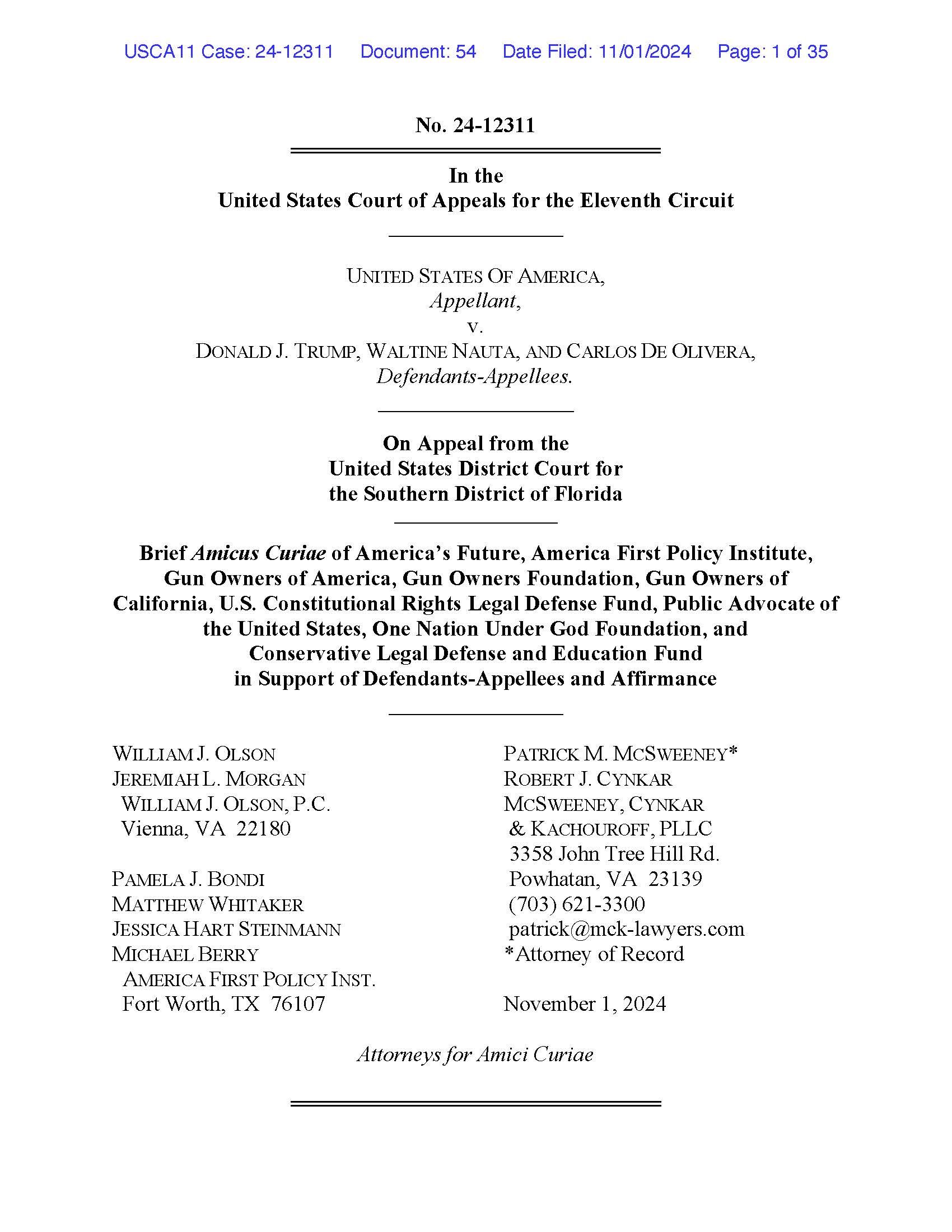UNITED STATES OF AMERICA, v. DONALD J. TRUMP Amicus Curiae
STATEMENT OF THE CASE
On November 18, 2022, Attorney General Merrick B. Garland announced that he had appointed John L. Smith “to conduct the ongoing investigation referenced and described in the United States’ Response to Motion for Judicial Oversight and Additional Relief, Donald J. Trump v. United States, No. 9:22-CV-81294-AMC (S.D. Fla. Aug. 30, 2022).” Office of the Attorney General, Order No. 5559-2022, Appointment of John L. Smith as Special Counsel, ¶ (c) (Nov. 18, 2022). The Attorney General’s Order authorized the Special Counsel “to conduct the ongoing investigation into whether any person or entity violated the law in connection with efforts to interfere with the lawful transfer of power following the 2020 presidential election or the certification of the Electoral College vote held on or about January 6, 2021.” Id., ¶ (b). The Order relied on 28 U.S.C. §§509, 515, and 533 as authority for the appointment. Id. (Introduction).
On February 22, 2024, former President Trump moved to dismiss the superseding indictment, on the grounds that the appointment of the Special Counsel violated the Appointments Clause of the Constitution (Art. II, §2, cl. 2) and that the funding for the Special Counsel from the permanent indefinite appropriation for the Department of Justice violated the Appropriations Clause
(Art. I, §9, cl. 7). United States v, Trump, No. 9:23-CR-80101-AMC, Doc. No. 326. On July 15, 2024, the District Court granted Trump’s motion to dismiss. Id., Doc. No. 672. Special Counsel Smith has appealed the District Court’s dismissal order to this Court.
SUMMARY OF ARGUMENT
The appointment of Special Counsel Smith violated the express requirement of the Constitution’s Appointments Clause that the office in question “shall be established by Law.” Congress has not enacted a statute establishing the office of Special Counsel and cannot be said to have done so by implication, as the Special Counsel argues.
Special Counsel Smith contends that he is an officer of the United States and not simply an employee of the Department of Justice. Beyond question, his position has been vested with significant authority (pursuant to regulations promulgated by a previous Attorney General) even if his jurisdiction is limited to the matters described in the order appointing him. The regulations purport to create a position that is continuing even though Special Counsel Smith’s appointment would appear to expire upon the resolution of the matters assigned to him.
Special Counsel Smith contends that he is an inferior officer. However, he is acting as a principal officer because he (i) is not effectively supervised by a superior officer, and (ii) has the authority to bind the United States as he executes his responsibilities in the two matters that he has been assigned. Due to the extraordinary attributes of that office which call for independence of the Special Counsel, the selection of the individual to serve in that position should not be consigned to the Executive Branch exclusively, but requires “the Advice and Consent of the Senate….”
The delegation of authority claimed by the Special Counsel presupposes a grant of legislative power to the Attorney General to establish an office of the United States in violation of the Framers’ check on the power of the Executive Branch to create offices by requiring they “be established by Law.” The claimed statutory authority of the Attorney General to create an office that exercises “the full power and independent authority” of a United States Attorney with no effective supervision of or control over the Special Counsel violates the non-delegation doctrine.
The Special Counsel Regulations promulgated by the Attorney General restrict the ability of the President and the Attorney General to hold the Special Counsel accountable for his actions and decisions, thereby clearly violating the Constitution’s Vesting Clause and the Take Care Clause.
The statement in United States v. Nixon, 418 U.S. 683, 694 (1974) that Congress has given the Attorney General the authority to appoint a Special Prosecutor does not mean that the Attorney General has the authority to create an office of the United States. No party in Nixon raised the issue of the Attorney General’s authority to create a federal office, and the Nixon Court never addressed that issue. The absence of any reasoning to support the proposition that is claimed to be binding certainly does not have that effect.
This nation’s checkered history of appointing Special Prosecutors, Independent Counsel, and Special Counsel provides no consistent or relevant factual pattern that can overcome the constitutional bar to appointing the Special Counsel to an office which has not been “established by Law.” The examples on which Special Counsel Smith relies are inapposite and cannot overcome the express requirement of the Appointments Clause.
